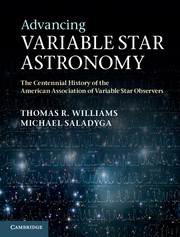 Advancing Variable Star Astronomy
Advancing Variable Star Astronomy Book contents
- Frontmatter
- Contents
- Foreword
- Preface
- Acknowledgments
- PART I PIONEERS IN VARIABLE STAR ASTRONOMY PRIOR TO 1909
- PART II THE FOUNDING OF THE AAVSO – THE WILLIAM TYLER OLCOTT ERA
- PART III RECORDING AND CLASSIFICATION – THE LEON CAMPBELL ERA
- 5 Leon Campbell to the rescue
- 6 Formalizing relationships
- 7 The Pickering Memorial Endowment
- 8 Fading of the Old Guard
- 9 Growing pains and distractions
- PART IV THE SERVICE BUREAU – THE MARGARET MAYALL ERA
- PART V ANALYSIS AND SCIENCE – THE JANET MATTEI ERA
- PART VI ACCELERATING OBSERVATIONAL SCIENCE – THE ARNE HENDEN ERA
- Appendix A AAVSO historiographic notes
- Appendix B Top AAVSO observer totals
- Appendix C Variable star observing groups represented in the AAVSO International Database
- Appendix D AAVSO Awards
- Appendix E Officers of the AAVSO
- Appendix F AAVSO Council members
- Appendix G AAVSO Scientific committee, section, division, and program chairs
- Notes
- Bibliography
- Index
9 - Growing pains and distractions
from PART III - RECORDING AND CLASSIFICATION – THE LEON CAMPBELL ERA
Published online by Cambridge University Press: 13 June 2011
- Frontmatter
- Contents
- Foreword
- Preface
- Acknowledgments
- PART I PIONEERS IN VARIABLE STAR ASTRONOMY PRIOR TO 1909
- PART II THE FOUNDING OF THE AAVSO – THE WILLIAM TYLER OLCOTT ERA
- PART III RECORDING AND CLASSIFICATION – THE LEON CAMPBELL ERA
- 5 Leon Campbell to the rescue
- 6 Formalizing relationships
- 7 The Pickering Memorial Endowment
- 8 Fading of the Old Guard
- 9 Growing pains and distractions
- PART IV THE SERVICE BUREAU – THE MARGARET MAYALL ERA
- PART V ANALYSIS AND SCIENCE – THE JANET MATTEI ERA
- PART VI ACCELERATING OBSERVATIONAL SCIENCE – THE ARNE HENDEN ERA
- Appendix A AAVSO historiographic notes
- Appendix B Top AAVSO observer totals
- Appendix C Variable star observing groups represented in the AAVSO International Database
- Appendix D AAVSO Awards
- Appendix E Officers of the AAVSO
- Appendix F AAVSO Council members
- Appendix G AAVSO Scientific committee, section, division, and program chairs
- Notes
- Bibliography
- Index
Summary
The more fields of endeavor we can open to the amateur the better, even if their work may not be so thorough or extensive. We never know to what ends such work may lead, or what may result from such a program.
– Leon Campbell, 1945, from a memo to Harlow ShapleyConditions in the United States changed dramatically on December 7, 1941: the Japanese attacked Pearl Harbor, resulting in enormous losses in US lives and warships. The US Congress declared war, and the subtle preparations that had been evident to a careful observer for some time suddenly became overt and intense.
Everyone's life would be affected by the events that followed, and they would have a share in the burden of the war that had, heretofore, been remote for most Americans. A few, such as Leon Campbell, had been aware of the war's impact on observers. George Ensor, a supervisor of a hospital laboratory, had already stopped observing in 1940, acknowledging that at the end of a day, “The work is stiff so I am too tired for anything but bed after my dinner. … Even occultation work has been dropped.”
There seemed to be little doubt; this war would not end as quickly as World War I after the United States entered that conflict, nor with as little engagement from ordinary US citizens. The AAVSO would feel the demands of the war, particularly on its skilled members who were called to assist in war efforts.
- Type
- Chapter
- Information
- Advancing Variable Star AstronomyThe Centennial History of the American Association of Variable Star Observers, pp. 110 - 126Publisher: Cambridge University PressPrint publication year: 2011


